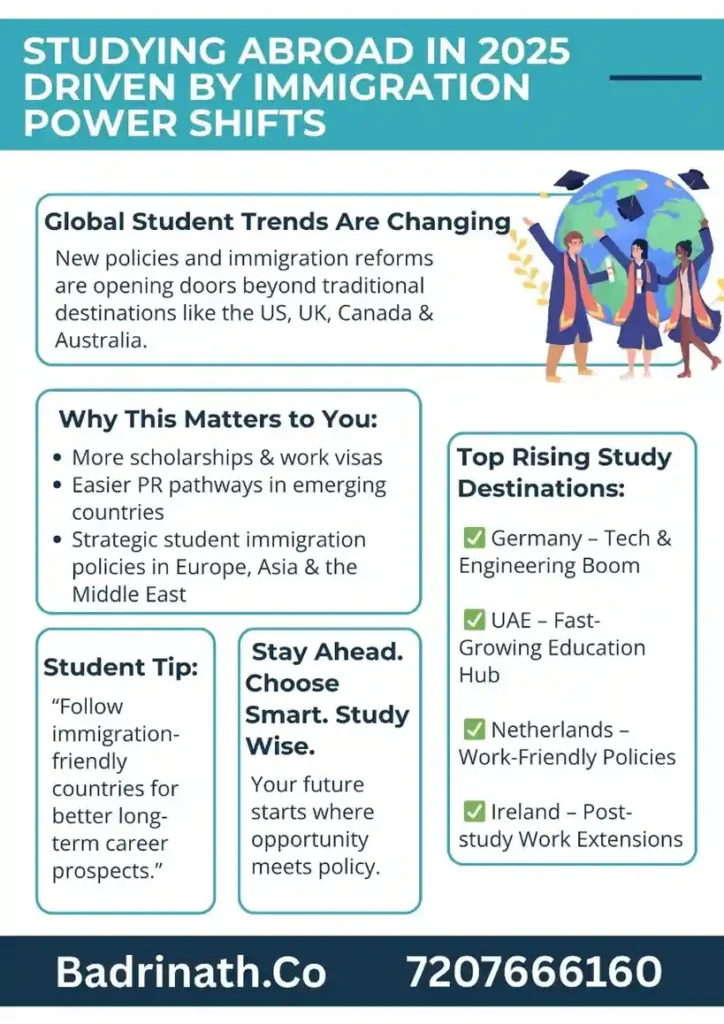Introduction
Once upon a time, studying abroad was just about chasing academic dreams, living new adventures, and maybe scoring a cool degree. Fast forward to 2025, and the story has flipped dramatically. Now? It’s less about your dreams and more about a country’s immigration game.
From visa crackdowns to post-study policy U-turns, the landscape is shifting fast—and not always in favor of the student. Governments are using international education like chess pieces in their immigration playbooks. It’s not about who wants you to study; it’s about who benefits by letting you in.
Let’s unpack the real, raw truth about studying abroad in 2025.

The Global Landscape Has Shifted
The pandemic started it, but politics perfected it.
Countries are no longer opening their arms to students just for education. They now weigh every international admission like a strategic investment. Where students once saw opportunity, governments now see leverage.
China’s decline in outbound numbers, India’s massive surge, Africa’s rising aspirations—these shifts are redrawing the map of global education.
Countries Using Education as a Power Play
Canada – The Friendly Face with a Strategic Plan
Canada once looked like the most welcoming option. But in 2025, it’s getting choosier. The cap on international student intake and tighter postgraduate work rules have made headlines.
Why? It’s immigration math. Canada wants skilled migrants, not just students. You’re welcome—if you’re useful.
UK – Tightening Visas While Seeking Talent
Post-Brexit UK is juggling contradictions. On one hand, it slashes dependent visas; on the other, it promotes the Graduate Route.
It’s a bait-and-switch game. The UK wants the best brains, but not their families. In 2025, it’s “come alone, study fast, maybe stay.”
Australia – Balancing Enrollment and Borders
Australia opened its gates again after COVID—but it’s now fighting to find the balance. Policy swings between student encouragement and immigration skepticism are exhausting.
Students are left wondering: Should I even bother?
USA – From Open Doors to Vetting Visas
The American dream feels more like a reality check now. Sure, top-tier universities still welcome international students, but immigration hurdles are taller than ever.
Visas are scrutinized. Work permits are unpredictable. In 2025, it’s still possible—but no longer smooth.
Germany and EU – Free Education vs. Closed Borders
Yes, education may still be free in places like Germany. But what about staying after graduation?
The EU is tightening labor laws, making it harder to transition from student to resident. Affordable education, but limited future.
The Visa Game in 2025
More Students, Fewer Approvals
Record applications. Record rejections. Why? Governments are overwhelmed, under-resourced, and—let’s be real—politically cautious.
Rise of Point-Based Systems
Visa systems now resemble job applications. Age, subject, country of origin, financial background—everything is scored. It’s not about getting in, it’s about qualifying on paper.
Post-Study Work Visa Drama
Post-study work rights have become unpredictable. What was once promised is now revoked with a policy update.
The Dark Side of the Dream
Financial Pressures and Currency Fluctuations
Inflation and currency crashes have made foreign tuition a gamble. Students budget for $30K and end up owing $40K. It’s not just expensive—it’s risky.
Delayed Applications and Mental Toll
Visa delays mean missed semesters, lost scholarships, and dashed dreams. Students are anxious, depressed, and stuck in limbo.
Immigration Scams and False Promises
Desperation breeds vulnerability. Fake consultants, shady agents, and forged documents are common in 2025. And once caught, the consequences are brutal.
Education as a Pathway to Residency
Why Students Are Really Moving Abroad
Let’s not sugarcoat it—many aren’t studying just for the degree. They’re chasing a better life, stability, and a passport. Education is a means to migration.
Governments Know—And Are Adapting Fast
And the receiving countries? They know. That’s why policies are evolving to filter out those just “using” the system without real academic intention.
Winners and Losers in 2025
Students from Global South: High Risk, High Reward
India, Nigeria, Pakistan, Bangladesh—students from these regions face high costs and high visa scrutiny. But if they make it through, the rewards are unmatched.
Middle-Income Countries: The New Battleground
Countries like Vietnam, Brazil, and Indonesia are emerging as key recruitment zones. Governments woo them for diversity and numbers.
Universities Playing the Political Game
Revenue Dependence vs. Moral Obligation
Universities want the tuition. Governments want control. Caught in the middle, institutions are lobbying hard but often compromising student interests.
Institutions Turning into Immigration Brokers
Some universities offer “immigration packaged” admissions—blurring the line between education and migration agency.
How Students Can Navigate the Chaos
Choosing Countries Based on Long-Term Prospects
Forget just the course. Look at post-study options, permanent residency paths, and political climate.
Spotting Red Flags in Immigration Policies
Frequent changes, hostile rhetoric, and inconsistent approvals? Red flag! Do your homework.
Vetting Your University for Post-Graduation Support
Some universities help you stay. Others don’t care once tuition is paid. Pick wisely.
Tech’s Role in Shaping Migration Education
AI-Powered Visa Tools and Prediction Models
Predictive tools now help you estimate visa success before even applying. It’s like a visa crystal ball.
Block chain for Credential Verification
Fake degrees and forged documents are being combated with block chain tech, helping clean up the admissions space.

Alternatives to Traditional Study Destinations
Emerging Hubs: UAE, Singapore, South Korea
These countries are offering competitive programs, modern infrastructure, and smoother immigration policies.
Remote Learning with Migration Incentives
Some schools offer hybrid or remote options tied to future residency perks. A smart move in an uncertain world.
Conclusion
The reality of studying abroad in 2025 isn’t just about education—it’s about immigration strategy, politics, and survival. Countries are shifting from welcoming to wary. Students are adapting from hopeful to strategic. Studying abroad still holds massive value. But it now demands smart choices, deep research, and constant vigilance.
External Links:
Understanding migration power in international studies
Immigration and work schedules: Theory and evidence
Internal Links:
“Indian Students Explore Study-Abroad Options Beyond the Big 4”
Privacy, Safety Fears Drive Australian Students Away from US Exchange Programs






